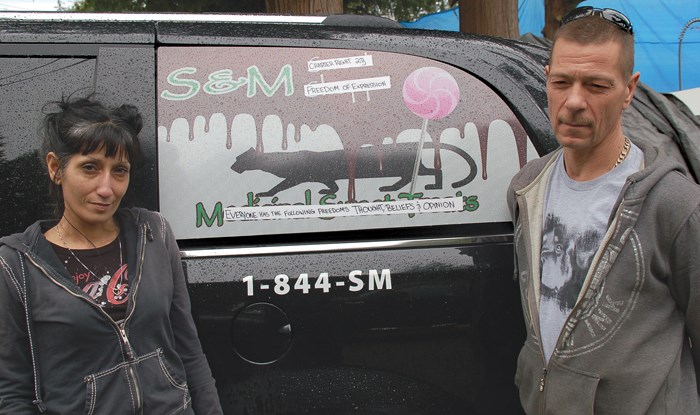The owners of S&M Sweet Shoppe, a home-based dispensary in Selma Park that was raided by RCMP on Nov. 28, 2015 for selling medical marijuana edibles to an undercover officer without a prescription, have now been charged with trafficking.
Doug Sikora has been charged with four counts of trafficking while Michelle Sikora has been charged with three counts.
Charges stem from different times the undercover police officer had contact with the Sikoras. Ultimately he purchased 23 marijuana-infused candies and four marijuana infused teabags from S&M Sweet Shoppe without a prescription.
The Sikoras said they were served with a summons for the charges on March 8 while waiting to enter provincial court to challenge the Sunshine Coast RCMP seizure of about $100,000 worth of product and other related business items taken during the raid.
In court, the Sikoras said, they won the right to have their van returned to them with the stipulation some wording in the advertising on the van be covered up.
Michelle said the van was returned because the Sikoras were able to prove it was a hardship to have it remain in RCMP custody. At present the van is their only working vehicle.
The Sikoras still plan to appeal in Supreme Court the seizure of other items such as their cell phone, computer, Doug’s journals and various forms of advertising, because the couple says they weren’t afforded three days notice of the RCMP’s application to keep the items seized for more than 90 days.
“When they’re seeking an extension they have to give three clear days notice to us. So they didn’t do that, which meant that we weren’t allowed to be at the hearing to hear what evidence they were trying to give that showed they needed to hold on to it,” Michelle said.
“Because we would have said, ‘Your honour, this was a six-month investigation, they sought a telewarrant [warrant requested by phone], which requires urgent and exigency circumstances to get on a Saturday, and no charges have been laid, so why do they get an extension?’ But because we weren’t afforded that opportunity to be there we couldn’t present that.”
The Sikoras hope that by winning their appeal against having the extension granted they can also avoid being convicted on the counts of trafficking because those criminal charges weren’t laid until after the extension was granted by the court.
“We didn’t get charged until March 8. They got the extension granted on Feb. 18. So the whole case will revert back to then [Feb. 18]. They have to go by timeline,” Michelle said.
She plans to represent herself and Doug when they enter Sechelt provincial court on March 30 to face the charges of trafficking.
Sunshine Coast RCMP media relations officer Const. Harrison Mohr said it’s not uncommon for seizure extensions to be granted in certain types of investigations.
“In lengthy/complex investigations, detention orders for seized exhibits are commonly granted prior to charges being approved. Once charges are approved, the detention of seized exhibits is essentially extended automatically, although I’m not completely familiar with the ins and outs of the legal process and terminology,” he said.
“I can’t comment on specifics about the process of obtaining the extension (because I wasn’t part of it and I’m not aware of all the details), other than to
confirm that now that charges have been approved, the seized exhibits are subject to continued detention pending the court proceedings.”
If found guilty, the Sikoras could possibly face jail time, although Mohr wasn’t willing to speculate.
“I really don’t know what sort of penalty they could potentially be looking at. The CDSA [Controlled Drugs and Substances Act] states maximum penalties for trafficking offences, however obviously many considerations are taken into account during any sentencing proceedings,” Mohr said.
“By all accounts this may be a precedent-setting case.”



